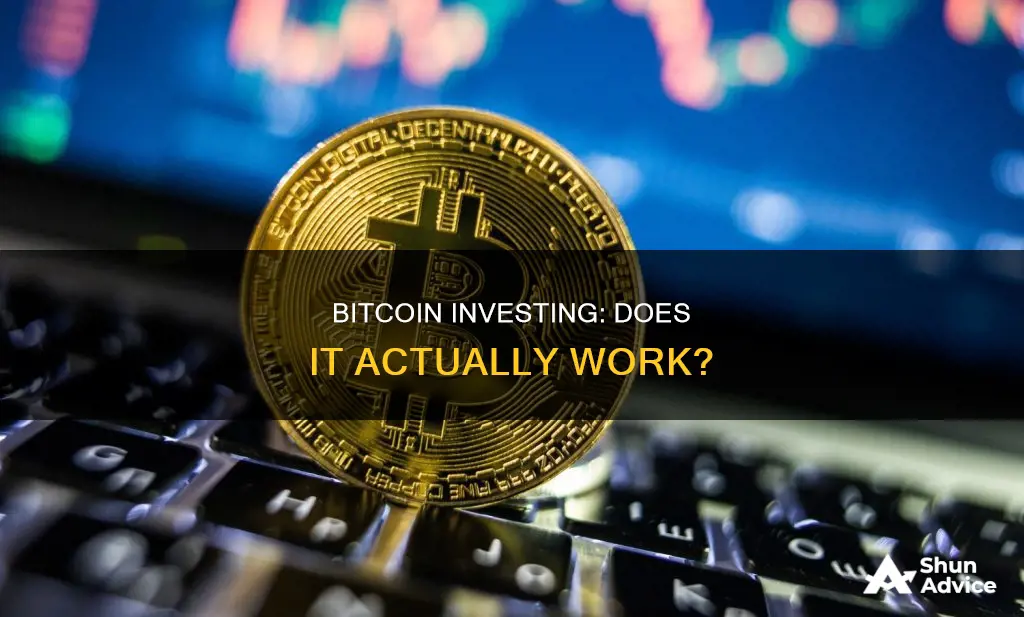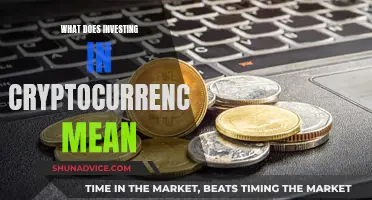
Bitcoin is a highly volatile, risky investment. Its price is unpredictable, and it's not regulated. However, some people believe in its potential as a decentralised currency, and its limited supply makes it attractive as a hedge against inflation. But is it a good investment? That depends on your appetite for risk.
| Characteristics | Values |
|---|---|
| Volatility | Bitcoin's price is highly volatile. |
| Liquidity | Bitcoin is a highly liquid investment asset. |
| Inflation Risk | Bitcoin is not subject to hyperinflation. |
| Security | Bitcoin is extremely hard to hack. |
| Regulation | Bitcoin lacks regulation. |
| Accessibility | Bitcoin can be bought and sold on exchanges, at ATMs, and through payment services like PayPal. |
What You'll Learn

Bitcoin's price volatility
Bitcoins Price Volatility
Bitcoin is considered a volatile asset. The volatility of Bitcoin is measured by how much its price fluctuates relative to the average price over a period of time. The more volatile an asset, the more people will want to limit their exposure to it, either by not holding it or by hedging. Volatility also increases the cost of hedging, which is a major contributor to the price of merchant services. If Bitcoin volatility decreases, the cost of converting into and out of Bitcoin will also decrease.
The cryptocurrency industry thrives on speculation, with investors betting that Bitcoin's price will go up or down to make a profit. This causes a sudden increase or decrease in Bitcoin's price, which leads to volatility.
Bitcoin's price is highly volatile, as seen by its drastic fluctuations in value. For example, investors who bought Bitcoin in December 2017 at $20,000 saw its value decrease to $7,051 just weeks later.
In the spring of 2020, when the world was looking for safe assets and gold was soaring, Bitcoin was flat. It eventually began climbing, but it's hard to say it became a counterweight to the pandemic's economic gyrations. Though it might be tempting to attribute this rise to inflation, Bitcoin's price peaked in November 2021 and then fell almost 50% while inflation was still climbing. Around the start of 2023, it bottomed out when inflation was beginning to wane, and as inflation fell, it quadrupled in value.
Bitcoin's recent resurgence has brought its Fear and Greed Index to neutral from extreme fear just a few weeks ago. Times of the greatest fear have generally been bullish indicators, and times of the highest greed are often bearish indicators.
The Volatility Index (VIX) for the S&P 500, a key indicator of market fear, has spiked to levels not seen since the COVID-19 crisis in March-April 2020. The VIX is now at its highest point since the 2008 financial crisis, underscoring the severity of the current market volatility.
Bitcoin has recently flashed a rare bear market signal, one that hasn't been seen since the beginning of the 2022 bear market. This signal, if confirmed, could suggest that Bitcoin is about to enter a prolonged period of downward price action.
Gold Coin Investment: Safe Haven or Risky Bet?
You may want to see also

Lack of regulation
The lack of regulation in the Bitcoin market makes it a risky investment option. Bitcoin is a decentralised currency, and its blockchain system is infinite, so there is little need to worry about cryptos losing their value. However, its price volatility means that holding onto Bitcoin for long periods may not be suitable for all investors.
In the US, the federal government has not claimed the right to regulate cryptocurrencies exclusively, leaving individual states to determine how their citizens can participate. The only concrete statements made about cryptocurrency from federal entities concern how people must report their profits (capital gains to the IRS) and how they are taxed (as property).
Europe, on the other hand, has built laws and regulatory bodies to guide the young fintech industry. Blockchain is almost purpose-built for new regulations demanding transparency of information and shared data between markets and institutions.
Switzerland has decided to embrace cryptocurrency in a non-regulatory manner, with the Swiss Federal Council stating that while there is no need to regulate cryptocurrency currently, laws on how the financial sector will make use of them are being established to determine their status as securities and taxability.
In Germany, Bitcoin is considered a "unit of account", and its citizens are free to trade it as they wish, but it is taxable and must incur VAT when traded with Euros. The country has also recognised the danger of some cryptocurrency concepts like ICOs and has issued warnings.
Japan is arguably the most cryptocurrency-positive country, recognising Bitcoin as a "legal means of payment", but not as a traditional currency. Banks are not able to offer their customers Bitcoin, but it is not unlawful to hold Bitcoins, leaving the sector to be driven by fintech innovators exclusively.
In contrast, some countries in Asia view the onset of cryptocurrency with fear. In Bangladesh, Nepal, and Kyrgyzstan, using or trading virtual currencies is highly illegal and comes with harsh punishments. China also has a rocky history with cryptocurrency. The lack of any regulation helped the country become an early adopter, but it went through a drastic reversal, and strict regulations were imposed on Bitcoin trading.
Is 9coin a Good Investment? Exploring the Pros and Cons
You may want to see also

Liquidity
High Liquidity vs Low Liquidity
High liquidity indicates a large number of participants and active trading, leading to smoother transactions and less price volatility. On the other hand, low liquidity implies fewer participants and less trading activity, resulting in higher price volatility and trading challenges.
Factors Affecting Liquidity
Several factors influence liquidity in the cryptocurrency market:
- The number of participants in the market. A high number of active traders increases the supply and demand for the asset, thus improving liquidity.
- The trading volume of an asset. Assets with high trading volumes are typically more liquid as they can be bought or sold in large quantities without causing significant price movements. Conversely, lower trading volumes are often less liquid, making it challenging to execute large trades without causing price fluctuations.
- The availability and accessibility of the asset on various exchanges. Cryptocurrencies listed on multiple exchanges and easily accessible to traders tend to have higher liquidity.
- Market conditions and economic factors. During periods of market uncertainty or economic downturns, liquidity can dry up quickly as traders become reluctant to buy or sell.
Bitcoin is a relatively liquid asset, though various factors can alter its liquidity at any given time. Its liquidity is usually high due to the number of established, trusted exchanges where traders can buy or sell Bitcoin. The more traders and higher volume of an exchange, the greater Bitcoin's relative liquidity.
In the context of cryptocurrency markets, liquidity providers play an essential role in facilitating smooth transactions and maintaining market stability. They are market participants, often large financial institutions or companies, that provide buy and sell orders to enhance market liquidity. Liquidity providers ensure there is always a ready supply of an asset for trading, allowing traders to execute their trades promptly without significantly impacting the asset's price.
Why You Don't Need Bitcoin to Invest in Ripple
You may want to see also

Bitcoin's finite supply
Bitcoin inventor Satoshi Nakamoto created the cryptocurrency with a cap to limit the supply. As of December 2023, there were approximately 19.57 million bitcoins in existence, leaving about 1.45 million bitcoins to be released. However, due to the use of rounding operators in the Bitcoin codebase, the total number of bitcoins issued is not expected to reach 21 million.
The finite supply of Bitcoin has significant implications for its value and investment potential. As a finite resource, Bitcoin becomes scarcer over time, driving up its price. The limited supply, coupled with increasing demand, has led to a million-fold increase in Bitcoin's value over a decade.
The finite supply of Bitcoin also affects the incentives for miners, who play a crucial role in securing the network and processing transactions. Miners are rewarded with Bitcoin block rewards and transaction fees. As the supply of Bitcoin decreases, the block rewards will reduce, and miners may push for higher transaction fees to compensate for the loss of block reward earnings.
While the finite supply of Bitcoin has driven up its value, it is important to note that Bitcoin is a highly volatile and risky investment option. The decision to invest in Bitcoin depends on one's risk appetite and perspective on the future of cryptocurrency.
The Ultimate Guide to Choosing Profitable Bitcoins
You may want to see also

Security and safe storage
The security of your Bitcoin investments depends on how you store them. There are two primary options: using a trusted custodian or providing your own custody.
Using a Trusted Custodian
Third-party custodians are a better option for inexperienced investors. Examples include traditional trading platforms, which are platforms that offer equities and crypto. The advantages of this method include a lower chance of losing access to your crypto and a simpler process for keeping your investments secure. The drawback is that some platforms do not allow you to send your coins to other wallets.
Providing Your Own Custody
If you decide to manage your own security, you will first buy crypto on a crypto trading platform. When you complete your purchase, it will initially be stored in a digital account (also known as a "hot wallet") managed by the platform. From there, you can consider transferring it to a digital crypto wallet or a physical, USB-like device known as a "cold wallet." The benefit of providing your own custody is that it gives you full ownership of your coins. However, it is more complicated and risky. If you lose the password to your wallet, you will not have access to customer service to recover it.
Security Measures
- Research founders' backgrounds: Crypto often attracts pump-and-dump scams, so it is important to research the founders' backgrounds before investing in a new cryptocurrency.
- Use established exchanges: Choose well-funded exchanges with a large number of employees and avoid those that offer high yields, as they are often not sustainable.
- Follow common-sense cybersecurity rules: Never share the key to your private or cold wallet, avoid bragging about how much crypto you have online, and be cautious of phishing scams and suspicious links.
- Use a combination of hot and cold storage: Hot wallets are more convenient but more vulnerable to hacking, while cold wallets are more secure but subject to theft or loss.
- Read the terms and conditions: Before signing up for a wallet or service, read the terms and conditions to ensure your cryptocurrency does not become a victim of the crypto liquidity crisis.
Security Risks
It is important to be aware of potential security risks associated with cryptocurrencies:
- Exchange attacks: Platforms with security vulnerabilities have been targeted by cybercriminals.
- Phishing emails and direct messages: These scams are designed to trick users into clicking on a fake link that gives the scammer access to their crypto wallet.
- SIM swaps: A bad actor can gain control of your phone by obtaining your phone number and contacting your carrier to request a new SIM card.
- Pump-and-dump scams: Bad actors hype a coin to attract new investors, then sell all their holdings at a profit, causing the price to fall.
- Limited legal protections: Payments with traditional debit and credit cards offer security features that crypto doesn't, such as not being liable for fraudulent purchases.
- Irreversible transactions: Crypto transactions are generally not editable or reversible, so there is no way to get a refund if something goes wrong.
Trinidad and Tobago's Bitcoin Investment Strategy
You may want to see also
Frequently asked questions
It depends on who you ask. Some people believe in the potential of Bitcoin as a decentralised currency and store of value, leading them to consider it a good long-term investment. However, others warn of its volatility and lack of regulation, making it a risky investment option.
No, it's not too late to buy Bitcoin. While the cryptocurrency has seen volatile price fluctuations, it continues to gain mainstream adoption and acceptance. However, it's important to do your research and understand the risks before investing.
You can buy Bitcoin through cryptocurrency exchanges such as Coinbase, Kraken, Gemini, and Binance. These exchanges allow you to connect a bank account or debit/credit card to purchase Bitcoin. You can also buy Bitcoin using payment processors like PayPal or through Bitcoin ATMs.
Bitcoin is built on blockchain technology, which makes it extremely difficult to hack. However, there have been instances of Bitcoin theft and fraud. It's important to use trusted brokerages and secure storage methods, such as hardware wallets, to protect your Bitcoin holdings.







